Most of the movie-going public agrees wholeheartedly—Thor: Ragnarok is great. Better than great. It’s I-just-ate-eleven-ice-cream-sundaes-and-don’t-have-a-stomach-ache great. It’s sort of like condensing delight into electricity and synth and lots of screaming. That’s basically what happiness is, right?
But here’s the best part; there’s way more going on in Ragnarok than psychedelic gladiatorial verve. This movie, which keeps being distilled down to “Thor and Hulk’s buddy road trip comedy” has a very keen eye turned toward Asgard’s history… and what was celebrated, and forgotten, and buried.
SPOILERS for Thor: Ragnarok follow.
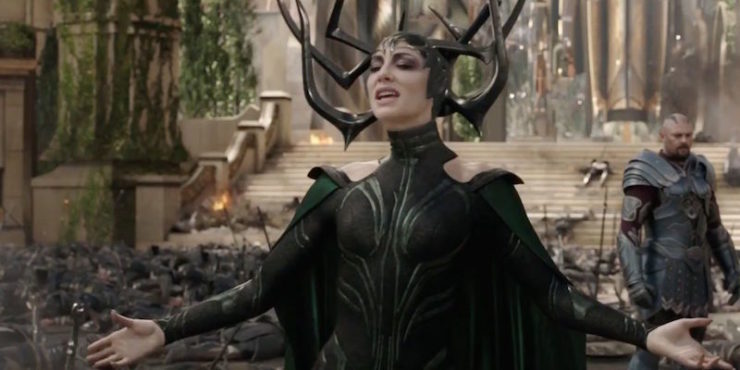
There are so many reasons to love this movie, it seems criminal. While broadening Marvel’s galactic scope much in the way that Guardians of the Galaxy does, Ragnarok is better at balancing the darkness and the light, the zany and the familiar. Every single actor, those both new to the universe and comfortable within its parameters, is on perfect form and clearly enjoying the ride. The film is stylistic dynamite, and the clear ad-libbing throughout only heightens the atmosphere. (Apparently director Taika Waititi came to Marvel with a two hour and forty minute first cut that the studio shaved down to ninety minutes in expectation of needing to shoot new material. They later added back forty minutes of that initial cut, as Marvel had come to realize that the playful, improvisational sense of humor was the essential component of the film’s success.)
And while it puts the characters from Thor on a brand new stage, the story itself blends perfectly with what we have been told about Asgard’s royal family so far. Not just in the sense of continuity, but in a real thematic sense that puts Asgard’s place in the galaxy into perspective. Or rather… Ragnarok dismantles that place with purpose.
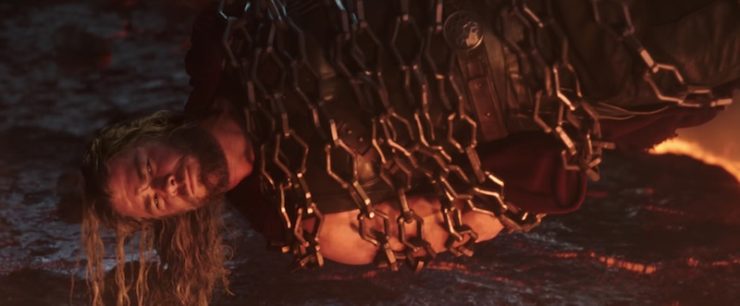
This makes the film’s setup quite important. Thor has left Earth post-Age of Ultron to find the Nine Realms—the ones Asgard is meant to watch out for—in chaos. On returning home with an item that should prevent Ragnarok (that’s Asgardian for “doomsday”) from ever coming to pass, he finds that Loki has been dressed up as Odin this whole time, and is enjoying his newfound power by forcing citizens to watch a play that showcases his supposed sacrifice in The Dark World, where he appeared to die in his brother’s arms. Despite Loki’s previous desire to have populations kneeling at his feet, the God of Mischief has given up his schemes and designs in favor of indulging his own narcissism and grandiose whims.
It’s a telling place to start because the actions and dynamics of Thor’s family are very much what Ragnarok means to address—and it begins with the acknowledgement that without any family to define himself by (or in opposition to), Loki barely functions. As Loki professed in the very first Thor film, he never truly wanted a throne; he merely wanted to be counted as his brother’s equal. It’s important to put that into perspective and also to focus on one particular aspect of Loki’s character that becomes even clearer in Ragnarok—while he may be a self-preservationist of the highest order and a purveyor of mischief and half-truths, Loki’s most prevalent wish is for people to openly love and/or praise him. This is one key aspect in breaking down how the princes of Asgard do not live up to the All-father’s idea of unassailable leadership, an issue that powers many of the events in the Thor films, as it does in Ragnarok.
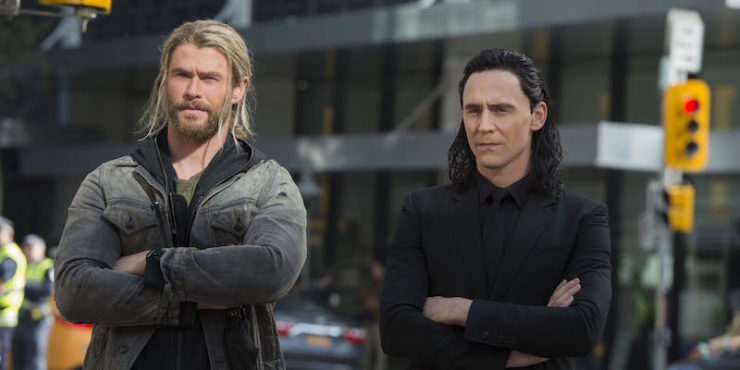
Thor forces Loki to show him where he’s been keeping Odin all this time, and after a brief runaround on Earth, they find their father at death’s door on a Norwegian cliffside. He admits to them both that he’s been keeping one hell of a secret: Thor is not his firstborn, and the brothers are about to meet their elder sister Hela, Goddess of Death. Apparently, Odin locked his daughter away when her power grew too difficult to keep a lid on. His life-force has been the only thing keeping her imprisoned, and following his quiet death, she shows up in all her glory and commands her brothers to kneel, as it’s her turn to take over. After she crushes Mjolnir to tiny pieces, Loki calls for the bifrost to escape her, and both he and Thor are knocked off the bridge while Hela makes her way home.
Here’s where everything gets really interesting—Asgard has no memory of Hela. When she arrives, no one knows who she is, or understands why she would be on their doorstep following Odin’s demise. After massacring the entire Asgardian army (including the Warriors Three—R.I.P. Hogun, Volstagg, and Fandral), she makes it to the throne room with a disgruntled Asgardian warrior named Skurge, and finds murals on the ceiling of a happy royal family… one that she has been utterly erased from. Tearing down those images shows the old story beneath it, one of Odin using his daughter as his right hand to subdue the Nine Realms and establish Asgard as the superior might overlooking them all. She apparently became furious that he wouldn’t expand their reach even farther, and now intends to continue conquering the galaxy with an army of the dead at her disposal just as soon as she gets her hands on the Bifrost sword, which Heimdall has dragged off for safekeeping.
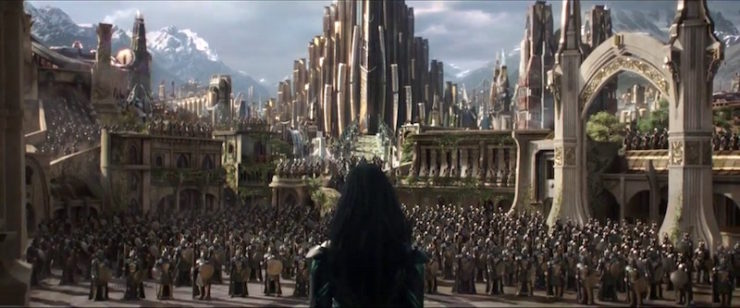
While Hela wreaks havoc at home, Thor and Loki are deposited onto a trash planet somewhere on the outskirts of the galaxy called Sakaar, where Loki gains favor with a quirky but megalomaniacal ruler known as the Grandmaster (brother to the Collector, who we met in Guardians), and Thor is abruptly captured by a mercenary known as Scrapper 142. She sells him to the Grandmaster for his gladiatorial fights, the central entertainment of the planet. Thor is set to fight the Grandmaster’s main champion, who turns out to be none other than the Hulk, but trying to get through to his old friend doesn’t quite work out the way Thor hoped. He finds out that the Scrapper who sold him used to be a Valkyrie on Asgard, member of the world’s only elite female fighting force, but that she hasn’t been back in ages—in fact she hasn’t been back since all the Valkyries were slaughtered by Hela when she attempted to break out of the prison constructed for her by dear old dad.
Eventually, Thor convinces Valkyrie, Hulk (who is currently in Bruce Banner form), and Loki to come back to Asgard and defeat his sister. That plan involves getting the gladiators to revolt, leading to a rebellion on Sakaar to overthrow the Grandmaster and distract him from their escape. Loki leads the gladiators to Asgard with a large ship to help rescue the citizens as Thor figures out what he can possibly do to stop Hela, whose power is growing by the second. That’s when he realizes that the only way to do so is to cause Ragnarok, giving up the realm of Asgard to keep its people and the rest of the galaxy safe. They set out towards Earth as a refugee race, and Thor finally steps in to rule the Asgardian people with friends and family at his side.
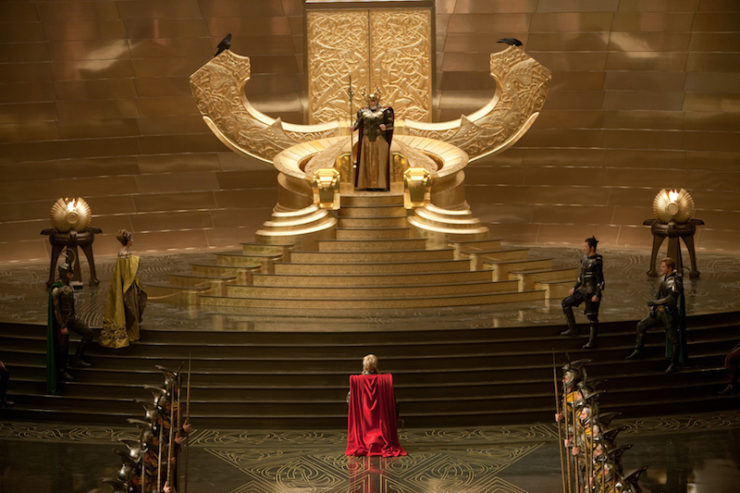
For all that Ragnarok seems like an exuberant romp through the Marvel galactic-sphere, its conflict is powered by the lies told by empires when they decide that they would prefer to forget their past misdeeds. This is true for both Sakaar and Asgard in different ways: the Grandmaster prefers to think of himself as a cool and groovy ruler when he clearly isn’t, and Asgard underwent a “rebranding” of sorts when Odin decided that Nine Realms were plenty to have under his jurisdiction. This shouldn’t come as a surprise to fans of the MCU at all, particularly since this idea has been seeded in the Thor films from the very beginning. Ragnarok is merely bringing all these ugly ideas to the surface and allowing us to see where everything has been taped together and painted over.
The first Thor film depicts Asgard as a shining and glorious fantasy kingdom in space, with a magical old ruler who makes a few mistakes in how he chooses to raise his sons. Specifically, Odin misses every chance to redirect Thor’s inflated ego into more empathetic leadership, and makes Loki feel inferior to his elder brother at every turn, despite insisting that either could be king of Asgard. After banishing Thor to Earth for being a product of his upbringing, Odin reveals to Loki that he was adopted from Jotunheim, planet of the Frost Giants. After a final war between their peoples that resulted in their current standing peace treaty, Odin found their king’s son abandoned in a temple for being too small. He took the child and raised him as his own with a specific thought in mind—one day, Loki could return to Jotunheim as a son of Asgard with a direct claim to the Jotun throne, bringing about permanent peace between their peoples. Of course, he never told Loki this as he was being raised as an Asgardian to hate Frost Giants.
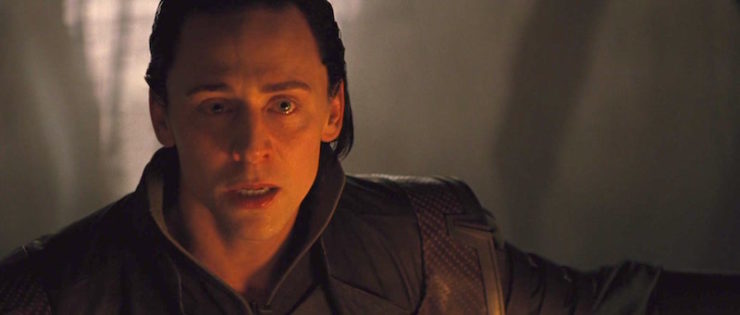
Loki, understandably, does not take this news very well. He attempts to prevent Thor’s return to Asgard, then tries to kill both his brother and the Frost Giants in hope of proving himself. When he suggests that Odin should help him finish off the people of Jotunheim and the king refuses, Loki allows himself to fall through an abyss in space, and only makes it back out with the help of Thanos, considerably worse for wear. He goes to conquer Earth on Thanos’s behalf, attracting Odin and Thor’s attention once more. The attempt fails and Loki is returned to Asgard in chains, sent to prison permanently for his crimes.
This punishment looks a tad ironic once Thor brings his human girlfriend Jane Foster back to Asgard after she accidentally absorbs an Infinity Stone known as the Aether. While the Nine Realms are technically part of Odin’s galactic jurisdiction, he tells Thor that the human woman he loves would be better helped by her own planet’s doctors, and compares her sophistication to that of a goat. (So Loki should feel bad for trying to rule humans, but Odin barely thinks of them as sentient. Good to know.) It’s only once he realizes what resides inside of her that he agrees they must help. The Aether was originally used by the Dark Elves, and once it activates in Jane, their leader Malekith comes out of hibernation to claim it. The Dark Elves were subdued by the Asgardians back during the time of Odin’s father, Bor, when he brought an end to their reign and their plan to plunge the universe into darkness. While this all sounds reasonable from the denizens of the current light-filled galaxy, it is never made clear whether the Dark Elves had a real claim on the nature of existence before the Asgardians started throwing their weight around.
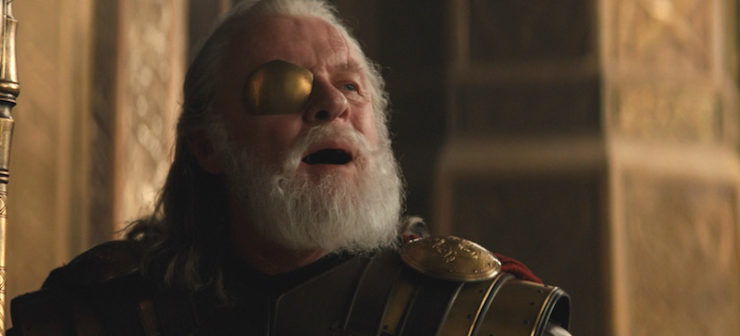
In attempt to beat Malekith back while grieving the murder of his wife Frigga, Odin orders his men to fight at all costs, leading to many unnecessary deaths that Thor takes him to task for. When he asks his father how his willingness to sacrifice the lives of his people makes him any different than Malekith, Odin replies, “The difference, my son, is that I will win.” Thor disagrees so vehemently with this concept of leadership that he eventually commits treason with his friends (and Loki) in order to prevent the Dark Elves from destroying the universe with the Aether.
Ragnarok puts many of these choices into perspective. In terms of the history of his reign, Odin is as immovable and vicious as ever, but he hides it behind a carefully cultivated veneer of respectability. Hela tells Thor that when their father didn’t like something, he merely covered it up—and she’s right. He covered up Thor’s massive errors in judgement by tossing him over to another world. He covered up Loki’s heritage with Asgardian values and lessons. He covered up Hela’s existence with a new era of prosperity and new children to take her place. Then he covered up evidence that he had ever been a conquering juggernaut by literally painting over their murals, their history, to ensure that no one recalled a time when he had seemed anything else than the benevolent king.
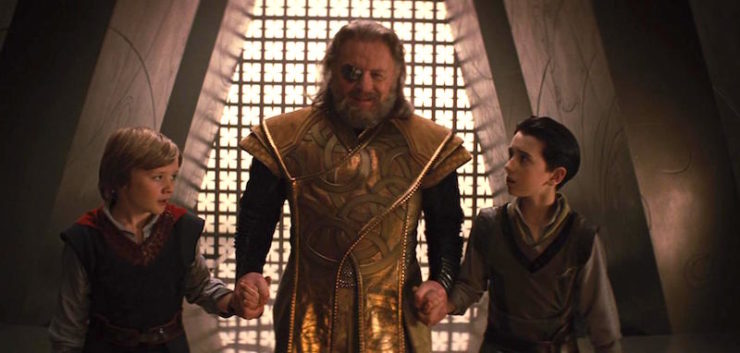
This is a real tactic that powerful countries and peoples employ in an effort to ignore their own participation in subjugation, colonialism, and systems of privilege. History books get rewritten so that events are more palatable. Stories are told to highlight the kindness and inherent rightness of the victors. Holidays are created for people who did abominable things. Resources are mined and historical artifacts are stolen away at night… and those things are never returned or paid for in kind. As Hela says to Thor, standing in the Asgardian throne room—“Where do you think all this gold came from?”
There are more layers to this, of course. It is relevant that Hela was Odin’s daughter rather than a son, because it speaks to what happens to women with power when men decide they have no use for that power in their grand designs any longer. Hela is her father’s right hand, his executioner, the one directly responsible for the emergence of his little empire. Then Odin literally seals his daughter up in some pocket dimension as soon as her power is too much for him to control. When she attempts to break free, he sends Asgard’s only all-female warrior class to stop her, which results in their annihilation… and their ranks are never replenished. Thor and Loki both look on Scrapper 142 as though she is something out of legend, because to them she practically is. In one swoop, Odin manages to bat away most of the female seats of power amongst his people.
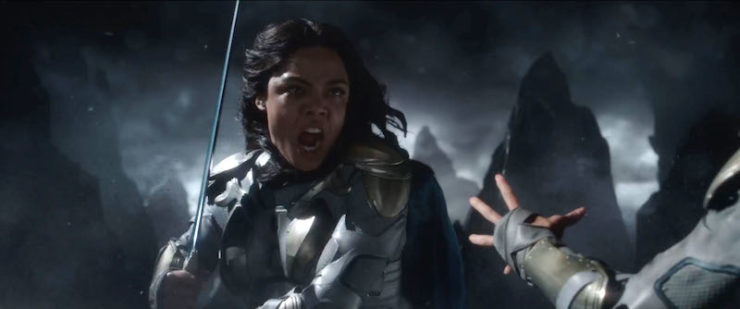
Of course it was right to stop Hela from trying to conquer the universe, but when you examine how he treats his sons, all is not equal. Thor is given an instrument to help him focus his power (that’s Mjolnir), Loki is held in prison rather than another dimension. Odin clearly knows he has made mistakes with his family, but Hela never benefits from that knowledge. Arguably neither does Loki, and that is hardly surprising—for Loki is the son of the enemy Odin subdued, the one who was taught magic “tricks” and how to fight like a Valkyrie by his mother. Loki was given Hela’s colors (black and green… with that added splash of gold for Asgardian prosperity), a replacement for the daughter Frigga ostensibly lost. Of course Loki would never be as trusted or revered as Thor, the son who was meant to do right where Hela did wrong.
Scrapper 142 (her name in the comics is Brunnhilde, by the way… unless they are pulling the same trick they did in Spider-Man: Homecoming with MJ, and she is only taking part of the namesake) tells Thor that Asgard’s problem is its leadership, and she is also right; “family squabbles,” as she puts it, have endangered the realm and anyone else who got in their way. When the people of Asgard come to realize that Loki has been playing the part of the All-father for a couple years, there is a brief gasp and then it’s business as usual because no one on Asgard finds it all that remarkable. The royal family have always been a source of turmoil. Even before that, Odin casts out one son, then falls asleep to leave the other one in charge at random, and Asgard continues on as it always has. What else can they possibly do?
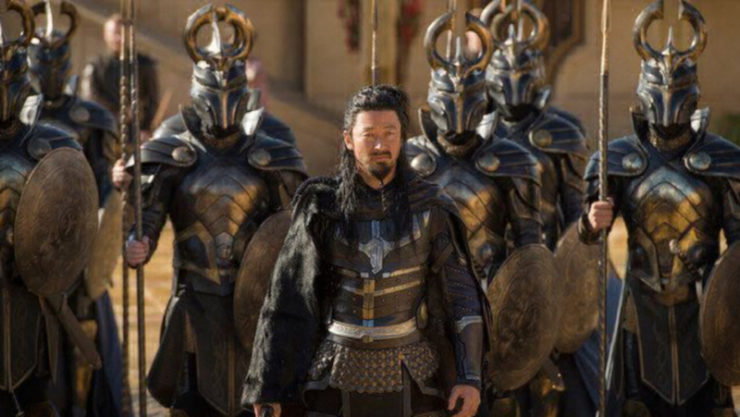
Odin keeps track of these Nine Realms as a benevolent ruler in their current timeframe, but that requires constant upkeep and care, something that the Asgardians are not always in a position to provide. In the few years that the Bifrost is out of commission following the events of Thor, the Nine Realms descend into chaos, requiring Thor to remain home and defend these peoples against marauding and pillaging. When Loki ignores them while posing as Odin, the realms fall into chaos again in the space of roughly two or three years, meaning that Asgard has never done anything to make these worlds self-sufficient. Their fear of being toppled from their seat of power means that the other realms are relatively at their mercy when it comes to aid and peacekeeping (aside from Earth, which Asgard seems to have decided to leave alone after driving out the Frost Giants, probably because of its perceived primitiveness). This is also a tactic used by powerful groups in order to maintain their positions of privilege—when empires abandon their colonies, many of these places suffer economic collapse and upheaval, and Asgard’s withdrawal results in much of the same. While some of these peoples clearly still resent Odin for this state—the Frost Giants definitely do—there are others who have folded themselves into Asgard’s chain of command. Hogun is from Vanaheim, another of the realms, but his loyalty to Asgard is so profound that he still ends up dying for them. Odin has made it beneficial to ally with the conquerors, as Rome once did when expanding their empire across Europe.
This central theme is given further attention in Ragnarok on Sakaar, though the ideas presented there are deliberately tongue-in-cheek. The Grandmaster commands aliens from across the galaxy to fight and die at his behest. He tells Thor that if he prevails against the Hulk in combat, he will win his freedom, but then knocks the “Lord of Thunder” out before the end of the fight so that he can keep him on for future bouts. When the revolt occurs, the Grandmaster’s bodyguard, Topaz, tells him that the slaves have armed themselves—a term that he objects to. “The ‘S’ word,” he tells her. He doesn’t like it.
To which she replies, “The prisoners with jobs have armed themselves.”
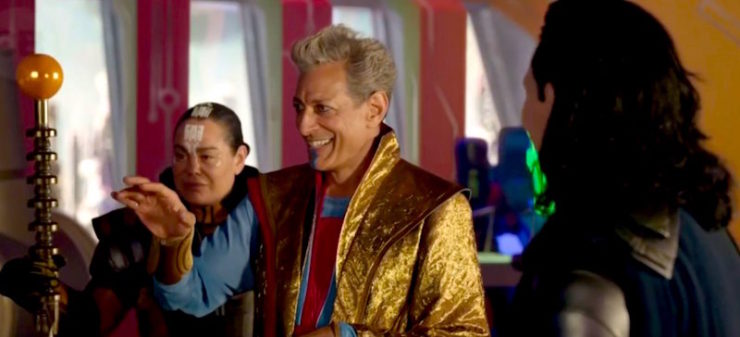
The Grandmaster likes that descriptor better, which makes perfect sense. Control over terminology is key for people who want to maintain power. It’s part of the reason that no one wants to be labeled as “Nazis” or “fascists” even when their group ideology is directly influenced by Nazi or fascist beliefs—no one wants the bad PR. The Grandmaster can still be a good guy, even if he keeps slaves to fight in an arena for the sake of distracting the masses with entertainment… just as long as he doesn’t call those poor souls “slaves.”
The final tag scene of the film just extends this theme to the very end. The Grandmaster steps out of a ship following the rebellion and tells all the common folk that they’ve done a great job revolting against him! And that he also did a great job because they could have never joined a rebellion without someone to rebel against! And then he tells them “It’s a tie.” Because remember, he’s imprisoned countless people on Sakaar, but the important part is that your fight for freedom ends with no clear winner or loser. The Grandmaster certainly doesn’t want anyone getting ideas about holding him accountable for the pain he’s caused over the millennia.
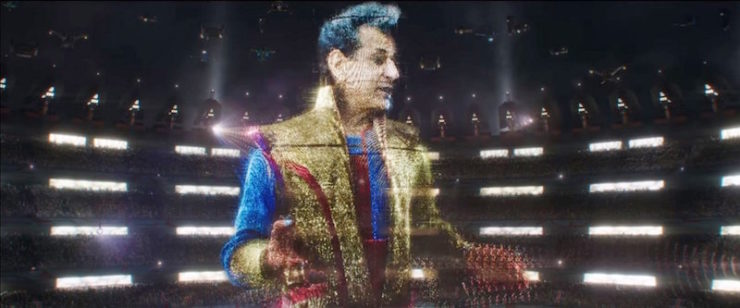
It is hardly surprising that Taika Waititi has pulled all of these threads together to finally give better context to the cost of Asgard’s rule, and the power wielded by many across Marvel’s galaxy. The Maori director, who carefully wove in references to make certain that aboriginal culture was reflected in the film, who made certain that it was shot in Australia and that Indigenous Australians and New Zealanders were hired for the production, has a direct understanding of how imperialism affects the people who are absorbed by or suffer beneath it. Ragnarok is not interested in maintaining the story sold in Thor, that Asgard is a gleaming beacon of culture and advancement led by fair-minded noble aliens who only interfere when their might is helpful to others. Asgard was built on the bones of the people it slaughtered, and no amount of paint can cover that up.
What can possibly ameliorate such a gruesome history? In effect, nothing truly can or will. But there is something among the House of Odin that makes a difference—Thor and Loki, sons of Asgard, want no part of this particular legacy. Loki’s failings are bound up in a desire to belong, to be lauded and included. Thor came to realize that ruling was not his ideal career path when he learned what horrific sacrifices leaders often make at the expense of others. Neither of them are a good candidate to continue the kingdom the Odin created, even if they had interest in doing so. And that is where hope emerges…
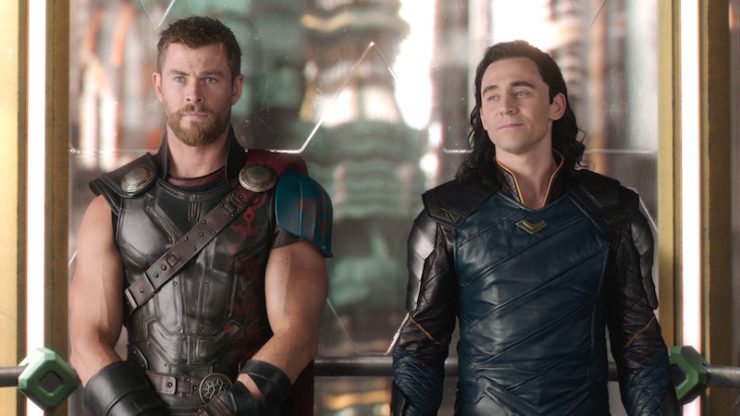
What Ragnarok posits is that Thor’s true calling is to free Asgard from the model created by his father and grandfather. Asgard is not truly about the gold and the conquering and the might of its army. It’s about the people who live there. People that he must safeguard and work with to create a different future. And with the help of a Valkyrie, Heimdall, a bunch of freed gladiators, and his adopted Frost Giant brother—who has clearly taken the Tesseract with them and will probably hand it over to Thanos in a few minutes, but at least he cared enough to rescue everyone in the first place—maybe he can finally make this work and break the cycles of abuse that created the Asgard he was born into.
Emmet Asher-Perrin knows that she said Sarek is the worst sci-fi dad, but Odin comes super close. You can bug her on Twitter and Tumblr, and read more of her work here and elsewhere.










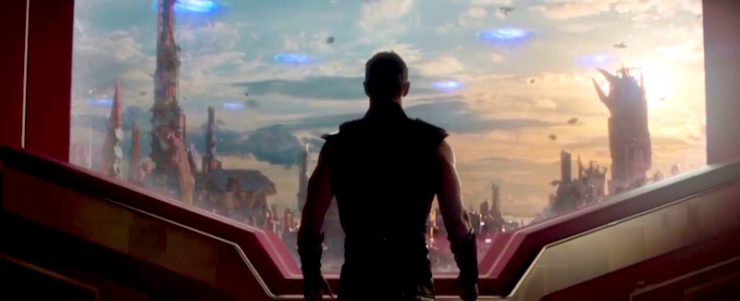
Great look into the trilogy as a whole, rather than just Ragnarok. I loved the film, particular because of many of the points made here. And that last line made the entire thing that much more enjoyable to read. I laughed at loud.
Great essay. It puts into perspective how a film that looks different on the surface is actually a logical continuation of the other chapters in the story.
Great review, Emily! I love your posts and writing style. It’s completely true that much of Odin’s behavior is common of empires, and that Asgard is terrible at managing the Realms and even Asgard itself.
Good point that Loki could be have been brought to Asgard for Frigga, they keep pointing her preference in The Dark World. I’m not sure if he is a replacement though, is Hela Frigga’s daughter or someone else’s, you know, gods aren’t usually fateful.
I only disagree with the part that statest that Thor convinced Loki to return to Asgard, Loki was going to betrayhim and he only appeared in Asgard to be seen as a savior, as you mentioned, he wasn’t going to missed this opportunity to “be loved and/or praised”.
Will have to see if Thor and Loki will rebuild Asgard as it was. If I’m not mistaken, Ragnarok isn’t like the Apocalipsis, it isn’t the end of a linear time, but a cyclical rebuilding. The world has to end to be reborn. That’s why I was expecting Odin’s reappearance during the movie.
I didn’t know the director was Maori, I’m happily surprised and like the actions to include and hire indigenous people.
In case anybody cares: The Goddess Hel is actually Loki’s daughter by the giantess Angrboda. Her brothers were the Fenrir Wolf and Jorimundr (or the last might be a sister) the world serpent.
@5 Thank you! I was wondering about Hela’s father in Norse Mythology.
I remembered a serpent but I’m not sure if Loki actually turned into a serpent once or if it’s Jörmungandr.
@5 I think it’s a testament to the movie’s storytelling that I twitched when Hella was introduced as Odin’s daughter and then promptly forgot that little re-write of the Norse myth.
My favourite exchange is was Loki saying something like “Let’s come to an arrangement” and Hella says, “You sound like him.” Never forget that Odin is as much a schemer and a con man as Loki. He just got better PR.
Brilliant article. Just one thing, there is nothing that indicates that Scrapper 142 is actually THE Valkyrie from the comics, Brunhilde… she’s most likely ONE Valkyrie. (I believe the blonde Valkyrie that dies for her in her memory is Brunhilde.)
Great essay about a marvellous film. Thank you, Emily!
Fantastic writeup for MCU’s Thor-verse. Spot on.
@5: Almost: the spelling is “Jörmungandr.” In order of birth, Fenrir was first, Jörmungandr was second, Hel third.
@7: I also twitched when Hela was introduced as Odin’s daughter, but let it pass since it made sense for the context of the story and the MCU isn’t about retelling Norse stories accurately, anyway. If it were, Thor would be a redhead. :)
My favourite parts involve Thor throwing things at Loki to see whether he’s actually there or just projecting his image, and Loki’s expression when Odin praises him for the spell that stripped him of his powers, saying Frigga would have been proud, and says, “I love you, my sons,” because to hear that he’s still loved despite everything he’s done gets to him in a way that no amount of harangue ever could. Bless Tom Hiddleston and his expressive eyes.
Solidly written piece. I enjoyed reading it, and it was very informative. I learned a few things I did not know, and it made me think about what I did know in a new way. Thank you.
Ragnarok was so disrespectful to the Thor source material. Major tragic events are treated with no gravity at all, and are made into jokes. Nothing matters.
This whole movie is the director deconstructing the Thor franchise and telling us, “Look! Look at how stupid this world is, and how outlandish its characters! Let’s just laugh at it because it’s a silly fantasy, and we don’t take fantasy seriously here. Oh, and Imperialism.”
The film upset me. It represents the bad side of postmodernism that doesn’t just question metanarratives and institutions, but degrades and mocks them without reflection on why they might actually be important.
It seems a little unfair to characterize Odin’s banishment of Hela as a parable for what happens to women with power when the men decide that power isn’t useful. He does the same exact thing to Thor when he feels that Thor’s love of warrior culture and conquest is endangering Odin’s plans/image. Why can’t it be a parable for what happens to people with power when those with more don’t find them useful anymore? In this context, it’s obviously not a choice based on sex, since it happens to both daughter and son.
I assumed that the blonde valkyrie who sacrificed herself to save Tessa Thompson’s valkyrie was meant to be Brunhilde, as a nod to the comics. (Incidentally, Thompson’s character is bisexual—though a scene indicating that was cut—making her Marvel’s first confirmed non-heterosexual character.)
@13: That’s my take, too. I read an interesting article yesterday (that I can’t seem to find now) that praised Hela for the irrelevance of her gender/sex—not that she was a masculine character, but that whether she was female or male had no bearing on her actions or motivations. I thought that was rather neat.
@3: The movie Hela has a lot in common with Tyr, the Norse god of war.* To quote from norse-mythology.org: “His role in the surviving Viking Age myths is relatively slight, and his status in the later part of the Viking Age may have been correspondingly minor. But this wasn’t always the case. Other kinds of evidence show us that Tyr was once one of the most important gods to the Norse and other Germanic peoples.”
Though Tyr was described as the son of Odin and Frigga in late Norse mythology, he may have been the chief god of the Germanic pantheon until Odin and Thor supplanted him (Odin shared Tyr’s role as god of war).
If Hela is regarded as a combination of the mythological Hela and Tyr (much as Thor shares a number of attributes with Baldur, including being the son of Frigga), her character makes a surprising amount of mythological sense.
*Advertising for the first Thor movie identified Sif as the goddess of war in the MCU.
This is now my favorite super-hero movie, and there have been a lot of great ones to choose from lately! Great review for a great movie. Taika was the perfect director for this.
“When the people of Asgard come to realize that Loki has been playing the part of the All-father for a couple years, there is a brief gasp and then it’s business as usual because no one on Asgard finds it all that remarkable.”
You mention that we lost about 30 mins of Taika’s first cut, but there were also many days of reshoots, and the content of those were largely unused as well. I can’t elaborate because it’s not content that is “out there” yet, but things were cut that make the above untrue, or at least unintentional. I’m betting we’ll be getting a lot of content on the eventual Blu-ray release.
“The prisoners with jobs have armed themselves.”
I feel like this line is part PR, like you say, but also part critique of the prison-industrial complex.
@12 Satire must really make you angry. Comedy as critique is integral to any culture, over our entire existance. You honestly think the director, who is Maori, doesn’t understand the gravity and scope of the theme of Imperialism, destruction of one’s homeland, and displacement of it’s peoples? WOW.
@@@@@ 5 Indeed myth Loki was the father of those 3. And apparently he’s also the MOTHER of an eight-legged horse. Norse mythology is awesomely weird.
@@@@@ 14
How can the Valkyrie be confirmed as bi-sexual when the scene isn’t in the movie? On-screen = canon. Never shot or on the cutting room floor = non-canon.
@10, thanks, I should have looked up the spelling.
This essay was extremely comprehensive except for the fact that it ignored the one thing that I was most looking forward to going in, and was only disappointed by the length of the scene: the Dr Strange cameo. We’re not sure how much time has passed between Dr Strange and Ragnarok, but Strange seems much MUCH better at magic now, and was wearing the Eye of Agamotto in his scenes with Thor and Loki, and I found that significant.
@13 – Andy: But Thor didn’t have the same level of power as Hela, nor was he imprisoned in isolation. He was just banished to Midgard, where he still could enjoy the company of other people and be free to live his life.
As someone for whom the Odin/Hela backstory was the biggest reveal of the entire film, I really appreciate that you’re only the second reviewer I’ve come across in any medium (essay or video format) that actually even mentions this aspect of the movie — and the only one who mentions it as more than just a footnote — while virtually everyone else is raging back and forth about the merits of a jokey Thor film. In fact, having watched and panned through many reviews, I was afraid that I was the only person who really noticed the imperialism aspect, and even then I didn’t fully grasp its context across the entire Thor franchise until I came across your piece.
I recently watched all the previously-released MCU films in a week-long binge — have to catch up on everything I’ve missed in the last decade before Infinity War! — and while I understood and grasped a lot of the parallels (intentional or not) regarding the various sociopolitical themes in the Earth-bound stories like the Captain America and Iron Man films — particularly since I was watching with an eye towards how vibranium and Wakanda was involved with the rest of Earth up until Black Panther’s actual first appearance, since Black Panther was my hook into the MCU in the first place — I always saw the Thor movies as this weird side venture that just existed for the sake of having a genuine space fantasy element in the MCU. Of course, given that Thor and co. are ultimately based on Norse mythology, I knew there was something rubbing me the wrong way about how benign these inspirations of Viking legends were being portrayed. More than anything else, I appreciate how Ragnarok was able to weave all of that in and deconstruct the gilded image, and much credit to Taika Waititi on really addressing it as extensively as he did without being explicit about it, to the point that it seems to have flown past everyone’s radar.
I watched an interview with him today promoting the film, and aside from his eccentric sense of humor, his reveal that he’s a deep Bob Marley fan really clued me in to the man’s sensibilities, particularly when he said that his favorite Marley song is “Zimbabwe”. That surprised me; you don’t usually hear one of Marley’s overtly political (and “unfriendly”) songs being cited as a favorite of someone who is a self-proclaimed fan of his — usually it’s something like “Three Little Birds” or one of the other songs you’re more likely to hear performed at a suburban school’s children’s concert or something — so this combined with what he did with Thor: Ragnarok actually makes me like and respect him that much more as a “conscious” artist.
As a closing thought on an already long comment, I find it very interesting that in Thor: Ragnarok we get a story that is in many ways the dismantling (and ultimately destruction) of a civilization that functions as a parallel to Western-based global superpowers, while the next film in Marvel’s line-up looks set to be a critique of the same Western superpowers, only this time told from the perspective of a demographic on the other side of the imperialist coin. (The “conquered and the conquerors”, to use King T’Chaka’s words from the Black Panther teaser trailer.)
Brilliantly put.
I think what makes the Thor films special is that push and pull between Loki and Thor, and Ragnarok really ties their arcs together again in such a great way. Thor essentially goes through what Loki did in the first film, all while confronting that history of racism and imperalism that brought Loki into his family in the first place.
Mostly agree, I think you made a small mistake about only Thor (the son) being given an instrument to focus his power (by implication, Hela, the daughter, was not). It looked like Hela had Mjolnir in the mural. Overall strong agree though, just quibbling.
One note on Mjolnir: as mentioned above, Hela seems to have had it (or a similar predecessor) at one point, but also remember that back in the first film, Odin uses it as a control on Thor. Hela’s clearly moved beyond needing it as a focus, so did Odin come up with the idea of using it as a control because of Hela’s rebellion…or did he try to use the original that way too, but she overcame it, leading to her contemptuous destruction of the current one?
Thanks for writing about the trilogy as a whole – glad to see an overview that really digs in to the material. I love the characters and themes so much, and was glad to see Ragnarok deliver an ending that built off the themes that the other films introduced but didn’t explore. I remember how surprisingly sincere and emotionally earnest the first THOR struck me, a truly unique superhero film that stands out even today. TDW has some incredibly moving parts as well, and its over-all-episodic nature can be forgiven now that we have Ragnarok to close out with ( slash start anew with?)
You really understand the characters and their motivations and are so articulate in exploring how those connect to the overarching themes of conquest, privilege and hope for the future. I’ve read this article three times through now and it just keeps getting better. Thank you.
Great article – having finally seen the film, I have to agree in every possible way.
It also acts as a neat explanation for why the Norse mythology is so different to the MCU – it’s all fake PR from Odin. This is the “real” story as it were.
@18
Watch the scene where Valkyrie is saved by her friend again. There are layers of meaning there.
@25
Agreed. It is also possible that Hela created Mjolnir in the first place, and removing it from her was part of Odin’s stripping away of her powers. Hence her easy destruction of it. The “whosoever wields this hammer” spell Odin casts on the Hammer only occurs in the first movie, prior to that I imagine anyone could wield it, and use whatever powers are contained within.
I read that too into that scene, but it’s still not confirmation, unfortunately.
I finally saw this one, and it may actually be my favorite of the MCU films so far. It has a coherent plot that makes sense and does not require anyone to be plot-stupid, it effectively synthesizes the sci-fi aspects of the MCU with the pseudo-medieval-ish Asgardian aesthetic, it provides villains who make sense and have goals that they act toward, it has great dialog and a good sense of humor without being a mere comedy, there is payoff for franchise-spanning events and character development, and it avoided being preachy while still making a point.
It may have been intended as a critique of imperialism, but in my viewing it was more about hypocrisy than anything else, at least as far as moral lessons go.
There were only really two small quibbles that I had with it: the CGI still isn’t quite up to the sequences where they need fully to animate a humanoid figure, and the thread about Banner’s fear that the Hulk would take over completely was kind of dropped. IIRC the film ends with him in Hulk form on the ship, which bodes ill for Banner.
Oh, one of the things I enjoyed most about the film was how they portrayed Thor once he managed to internalize and access his powers without a focus or limiter (such as mjolnir). I’ve always been a fan of lighting slingers in cRPGs and such, and the visuals in those two scenes were pretty nearly perfect.
@13: Because Thor was merely stripped of his powers and allowed a chance at redemption. If he were ever deemed worthy of Mjolnir again, his banishment would be over. Hela was imprisoned in a pocket dimension and when she tried to break free, Odin sent every single Valkyrie of Asgard to murder her.
Man, I keep returning to this article again and again. Got me into reading your other stuff as well, but I’m such a fan of this in particular. All so well put. I’ve always been aware of the imperialist undertones of the series – one of biggest complaints with the second film was not fleshing out Maletkith to be something of a freedom fighter and missing the opportunity of addressing how Asgard’s racism and hyper-masculine beliefs in conquering and subjugating others as a way to show strength and rightness may have well created their enemies – namely, the Dark Elves and Loki.
There probably was no place for it in the latest film, but I think it would be a shame to never address Loki’s internalized racism in the same way Thor’s bravado and sense of privilege were in Ragnarok. Here’s hoping that gets some closure someday. I’d love to see what Thor and Loki build together.
Finally got a chance to see it over Thanksgiving while the grandparents watched the kids :) I must be on Tor too much (ha!), because my first three thoughts after seeing this movie (without having any knowledge that this article existed) were:
1)This actually has some interesting, subtle points about colonialism, conquest and santizing of history. Is there really no other way forward than but razing it all to the ground? I’d like to think no – although one could start by not literally denying that it happened. Accountability and reparation can be a powerful thing. I thought the line, “Proud of all he has, ashamed of how he got it” was telling.
2)I was on the fence on if Hela herself is just another example of what happens to powerful, scorned women. But it also is an uncomfortable comparison for me since even before her banishment, she was a brutal, malicious person who desired to subjugate and conquer others. On the other hand, I totally feel her when, after giving her grand entrance speech, she gets addressed as ‘whoever you are’. “Whoever I am? Didn’t you listen to a word I said?” HAHAHAHA.
3)No joke, I sat there thinking, “I wonder if Emily would say Odin is a worse fantasy/sci-fi dad than Sarek?”. His bungling with Loki was bad enough. In some ways I question why Hela had to be their sibling in the first place – perhaps it was just to justify how powerful she was. They really didn’t do a lot with the sibling dynamics or the revelation that they had a sibling they flat out never knew about. Was she also Frigga’s daughter? It seems like they could have basically had the same story had Hela simply been one of his most trusted lieutenants/executioner whose ambition got out of control (this is also making me think of Oathbringer and the issues that Dalinar/Gavilar wrestle with – I HAVEN’T READ IT YET SO NO SPOILERS) once the conquerors decided to actually rule. Or a former lover/wife? (on second thought, no, I hate that idea, that’s way too cliche and reductive).
A few other things – I loved pretty much every thing about this movie, and probably laughed out loud at something in each scene. I’m also really interested in Loki’s arc (I have to admit, I’ve been waiting for him to make a return). There’s something in him that I think, in a very weak way, WANTS to be good, but it’s subsumed by his own desire for adulation, praise (OMG that play. LOL LOL LOL. But when you think about that, even that is symbolic of the theme, as it is a rewrite of history) and an almost *compulsion* to betray and embody chaos, tricks, etc. In general I’m not a fan of the ‘a leopard can’t change his spots’ moral, although I know it’s very, very hard and there is a point where I think we can’t completely change our temperaments. But I thought Thor’s speech to him that he’s just stuck in the same predictable loop will get through? I also (possibly because I enjoy Tom Hiddleston’s face a bit too much) found his facial actiong during certain moments (like when Odin addressed his sons, plural) as really touching.
I also like that Bruce/Hulk got a little more development. I honestly felt bad for him. One of my sons isn’t totally neuraltypical, and while things are much better now after fiinding the right interventions for him, we used to mention his similarities to the Hulk. He’s an otherwise sweet, sensitive boy for whom certain triggers caused extreme rage tantrums that led to him sometimes even putting holes in our walls, but also talking about how hopeless/stupid/bad he was (he’s six). The scene between Thor and Hulk in his chamber hit oddly close to home, even down to the body language. (I kind of wanted to smack Thor when he told him he was right, everybody hated him. It’s like insulting a little kid.)
I also got lots of amusement from imagining this entire movie about what would happen of Galadriel had taken the Ring and become a dark and terrible queen ;) (With Eomer at her side? And eventually meeting her fate at the hands of a balrog). All the while made easier by the fact that the Norse-inspired aesthetic, imagery and story shares so much with what influenced Tolkien. There were several points where even the music seemed to have a similar feel (and hey, you could even throw in a Led Zeppelin song if you wanted) and now I’m finding out it also was filmed in New Zealand. LOL. And really, knowing that the director is Maori does shed some more light on the specific themes.
Speaking of, I’m so glad Immigrant Song actually made an appearance as a real part of the soundtrack. And inexplicably the Willy Wonka song? LOL. That whole scene really reminded me of the creepy boat ride.
Watching Jeff Goldblum just chew on scenery was endlessly entertaining. “Ass gard” really shouldn’t be that funny, but I was dying.
I hope future movies give us more chances for Loki and Doctor Strange to interact because there’s a goldmine of potential there.
I also really enjoyed how the movie itself was put together – lots of well placed Checkov’s guns (literally, in some cases!), as well as call backs to other Avengers movies that just tied it all together. Aside from the overall arc itself, I feel like the groundwork laid in the MCU is starting to pay off in a lot of ways that make it pretty satisfying when you catch the references. The only thing that was a little irritating to me was Jane Foster being so unceremoniously written out. I’m not sure how much of that is due to the story no longer having a place for her, or if Natalie Portman just doesn’t want to be in it anymore, but I’d like to see her still have a role as a brilliant scientist on the Avengers’ side even if she’s not just ‘Thor’s girlfriend’ anymore.
Anyway – like I said. Really great, entertaining, fun, colorful movie but that also sowed some seeds for thinking bout more serious themes. I’m really glad we picked this one for one of the few movies we actually see in the theater because it was basically everything I wanted/expected – not exactly high cinema, but a lot of fun.
@12 Wesley, you nicely summed up for me why I really did not like this movie at all.
@32 – Lisa: Just recast Jane Foster and be done with that.
@32 Lisamarie, I always enjoy your comments to posts, they always enrich the discussion and you have a great sense of humour. You should totally write in Tor or elsewhere.
@32, 34
Portman has had enough of the character and doesn’t want to reappear. Which given she only got to play the damsel in distress in TDW kind of makes sense.
It’s a real shame that they didn’t ask her to come in and film a break up scene alongside the Civil War flatmate episodes. Would give her character some closure and keep the fans happy.
@36 – ah, that’s too bad, as her character had some potential.
@35, aw, thanks :) That was a really nice thing for me to come into work today to after vacation (working hard here, obviously!)
I found this old link about mythological Ragnarok. I feel it fits the discussion of the movie.
https://www.tor.com/2014/02/22/happy-ragnarok-time-to-choose-a-side
I realize I’m abominably late to this party, but I was finally able to see Ragnorok last night and I came immediately here to see the thoughts.
So thanks, Emily! I really thought I wasn’t going to like this movie, based on the previews, and I was quite glad to be proven wrong. This was exactly the bridge we needed between the serious Thor movies, the snarky but realistic other Avenger films, and the Guardians stories. It was difficult before to believe that all these places were connected, but this movie strategically made that connection believable. The music, which I thought I was going to hate, actually helped
Haha, the moment Loki sees the tesseract is perfect. “Yup, I’m on a mission, causing Ragnorok, grab the Helmet of Doom, no problem, gonna chuck it in the Eternal Fire of–oh hey shiny friend! You’re just gonna ride along in my pocket for a little while. Better to be prepared and all that.”
There were so many things to enjoy about this movie. Thor is done falling for Loki’s crap. Hulk is a friend from work – Sun’s getting low. Everything we thought we understood is a lie, carefully constructed. Let’s go to Earth.